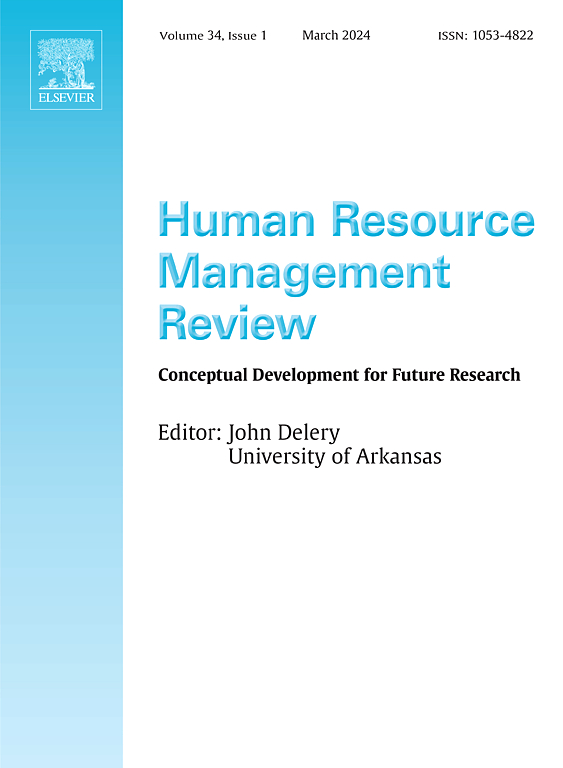Algorithm-Based Pay-for-Performance (APFP) systems: Paradoxes in artificial intelligence's influence on pay-for-performance theories
IF 13
1区 管理学
Q1 MANAGEMENT
引用次数: 0
Abstract
Although artificial intelligence (AI) and generative AI (GenAI) are increasingly used to assess and reward employees, their implications for foundational pay-for-performance (PFP) theories remain underexplored. Traditional PFP systems are effective in an era of static evaluations and infrequent feedback, but they lack the intelligence and flexibility needed for today's dynamic work environments. In response, we introduce algorithm-based PFP (APFP) systems—PFP systems that leverage AI and GenAI to enable real-time adaptability, predictive capabilities, customization, automated algorithmic recommending, and measurement sophistication. We then use the APFP framework to assess its implications for three foundational PFP theories (equity theory, expectancy theory, and tournament theory). The APFP framework integrates established PFP principles with AI and GenAI capabilities, reassessing how employees perceive, respond to, and engage with PFP systems. By conceptualizing how AI and GenAI influence the theoretical mechanisms of PFP, we offer a lens for understanding their influence on foundational PFP theories. Our theoretical contributions bridge existing PFP theories with emerging AI- and GenAI-driven environments to advance the literature and lay a foundation for future research that highlights inherent benefits and risks of APFP systems.
基于算法的绩效薪酬(APFP)系统:人工智能对绩效薪酬理论影响的悖论
尽管人工智能(AI)和生成式人工智能(GenAI)越来越多地用于评估和奖励员工,但它们对基本绩效薪酬(PFP)理论的影响仍未得到充分探讨。传统的PFP系统在静态评估和不频繁反馈的时代是有效的,但它们缺乏当今动态工作环境所需的智能和灵活性。作为回应,我们引入了基于算法的PFP (APFP)系统——PFP系统利用AI和GenAI实现实时适应性、预测能力、定制、自动算法推荐和测量复杂性。然后,我们使用APFP框架来评估其对三个基本PFP理论(公平理论、期望理论和竞赛理论)的影响。APFP框架将已建立的PFP原则与AI和GenAI功能集成在一起,重新评估员工如何感知、响应和参与PFP系统。通过概念化AI和GenAI如何影响PFP的理论机制,我们为理解它们对PFP基础理论的影响提供了一个视角。我们的理论贡献将现有的PFP理论与新兴的AI和genai驱动的环境联系起来,促进了文献的发展,并为未来的研究奠定了基础,强调了APFP系统的内在优势和风险。
本文章由计算机程序翻译,如有差异,请以英文原文为准。
求助全文
约1分钟内获得全文
求助全文
来源期刊

Human Resource Management Review
MANAGEMENT-
CiteScore
20.20
自引率
7.00%
发文量
0
审稿时长
48 days
期刊介绍:
The Human Resource Management Review (HRMR) is a quarterly academic journal dedicated to publishing scholarly conceptual and theoretical articles in the field of human resource management and related disciplines such as industrial/organizational psychology, human capital, labor relations, and organizational behavior. HRMR encourages manuscripts that address micro-, macro-, or multi-level phenomena concerning the function and processes of human resource management. The journal publishes articles that offer fresh insights to inspire future theory development and empirical research. Critical evaluations of existing concepts, theories, models, and frameworks are also encouraged, as well as quantitative meta-analytical reviews that contribute to conceptual and theoretical understanding.
Subject areas appropriate for HRMR include (but are not limited to) Strategic Human Resource Management, International Human Resource Management, the nature and role of the human resource function in organizations, any specific Human Resource function or activity (e.g., Job Analysis, Job Design, Workforce Planning, Recruitment, Selection and Placement, Performance and Talent Management, Reward Systems, Training, Development, Careers, Safety and Health, Diversity, Fairness, Discrimination, Employment Law, Employee Relations, Labor Relations, Workforce Metrics, HR Analytics, HRM and Technology, Social issues and HRM, Separation and Retention), topics that influence or are influenced by human resource management activities (e.g., Climate, Culture, Change, Leadership and Power, Groups and Teams, Employee Attitudes and Behavior, Individual, team, and/or Organizational Performance), and HRM Research Methods.
 求助内容:
求助内容: 应助结果提醒方式:
应助结果提醒方式:


